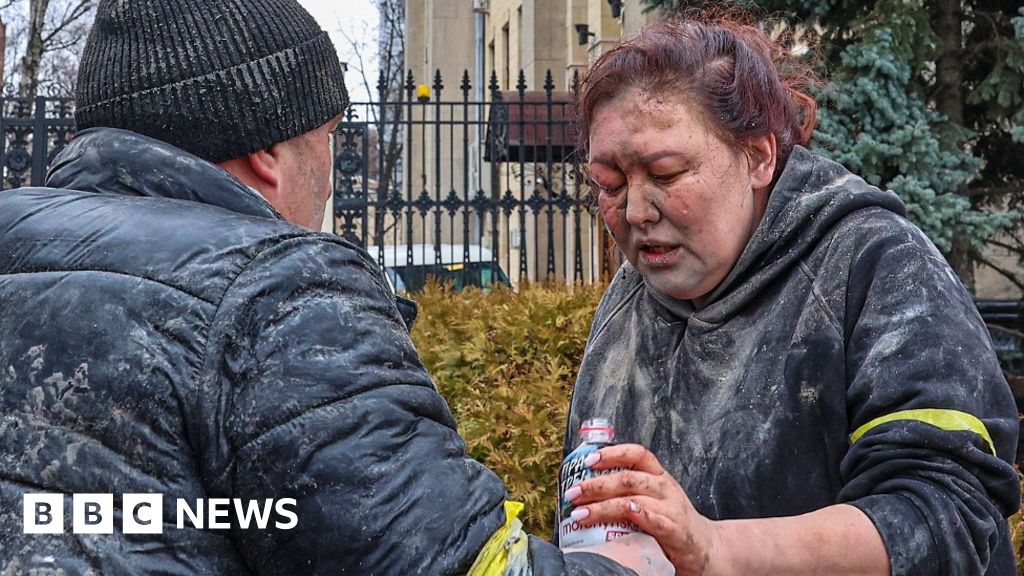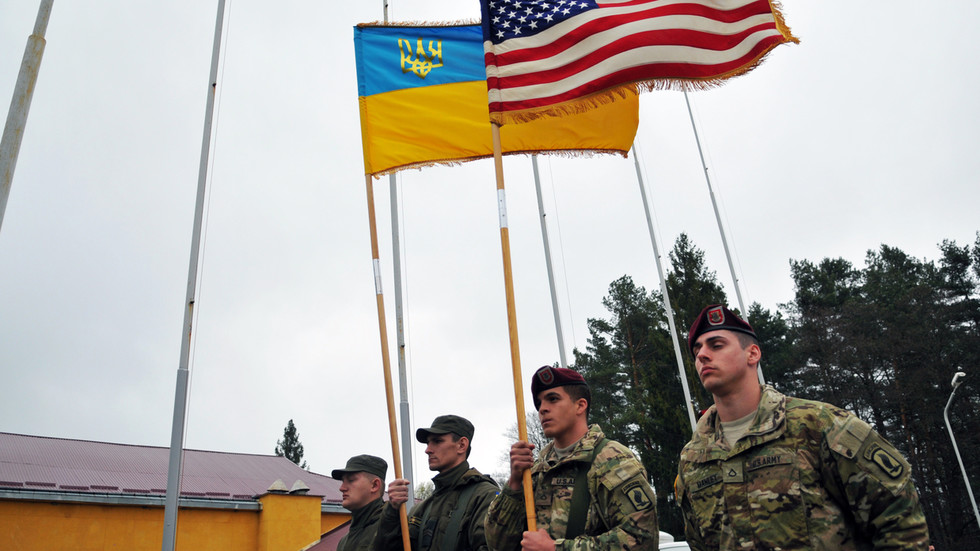
Pelosi Visit to Ukraine Signals
Growing US Resolve Against Russia
Steven Erlanger, Jane Arraf and Marc Santora / The New York Times
BRUSSELS (May 1, 2022) — House Speaker Nancy Pelosi traveled to Ukraine’s capital over the weekend, leading the second senior American delegation to meet with President Volodymyr Zelensky in a week and declare support for his country’s fight to beat back the Russian invasion.
With each visit — the secretaries of state and defense traveled to Kyiv last weekend — the promise of American commitment to a Ukrainian victory appears to grow, even as how the United States defines victory has remained uncertain.
On Sunday, a day after her visit to Ukraine, Ms. Pelosi told a news conference in Poland: “America stands with Ukraine. We stand with Ukraine until victory is won. And we stand with NATO.”
In one positive development on Sunday, the United Nations and the International Committee of the Red Cross helped organize what was described as an “ongoing” evacuation of civilians from the Azovstal steel works in Mariupol, where they have been taking shelter with a dwindling number of Ukrainian soldiers who have refused to surrender to the Russians.

Between 80 and 100 civilians arrived in a convoy of buses at a temporary accommodation center 18 miles east of the city, in the village of Bezimenne.
The evacuation appeared to be the fruit of a visit to both Mr. Putin in Moscow and Mr. Zelensky in Kyiv last week by António Guterres, the UN secretary general, who called the war in Ukraine “an absurdity.” Mr. Guterres and the Red Cross have been working to get humanitarian aid and supplies of food and water to civilians trapped by the fighting; any serious peace negotiations still appear far off.
In a Twitter message, Mr. Zelensky applauded the evacuation of what he said was a “first group of about 100 people,” and said that “tomorrow we’ll meet them in Zaporizhzhia.”
The UN Office for the Coordination of Humanitarian Affairs, or OCHA, said in a statement that it would not provide details of the effort while it was continuing; further evacuations are expected to resume on Monday.
Russian forces have not yet been able to finally take the last slice of Mariupol, which no longer matters militarily but which has been an inspiring symbol of Ukrainian bravery, morale and resistance that is bound to go down in Ukrainian history.
But if there is a new allied consensus about supplying Ukraine with heavier and more sophisticated weapons for the latest stage of the war in eastern Ukraine, there is no allied consensus about switching the war aim from Ukraine to Russia.
There is a sense in Europe that “the US is dragging everyone into a different war,” said François Heisbourg, a French defense analyst, citing similar comments by President Biden about “the butcher of Moscow” and how “Putin must go.”
Some wonder what Washington is trying to say — or do.
“To help Ukraine prevail is not about waging war against Russia for reasons related to its governance,” Mr. Heisbourg said. “Regime change may be a vision, but not a war aim.”
He and others said that such talk from Washington plays perfectly into Mr. Putin’s narrative that NATO is waging war against Russia, and that Russia is fighting a defensive war for its survival in Ukraine. That may give Mr. Putin the excuse on May 9, the annual celebration of the Soviet victory over Nazi Germany, to declare this “special military operation” a war, which would allow him, if he chooses, to mobilize the population and use conscripts widely in the battle.
Talk of victory over Russia “gives easy ammunition to the other side and creates the fear that the West may go further, and it’s not what we want,” said Ulrich Speck, a German analyst. “We don’t want to cut Russia into pieces.”
Gérard Araud, a former French ambassador to the United States and the United Nations, commented on Twitter: “The support to Ukraine in its modalities and its objectives should be agreed at a political level between allies. Right now, we are sleepwalking to nobody knows where.”

In response, Moscow has raised the tone of its own rhetoric. On Wednesday, Mr. Putin said that any countries who “create a strategic threat to Russia” during this war in Ukraine can expect “retaliatory strikes” that would be “lightning-fast.”
Days before, the Russian foreign minister, Sergey V. Lavrov, said in an interview that “NATO is essentially going to war with Russia through a proxy and arming that proxy.”
Mr. Putin’s military, having lost what Britain estimates to have been at least 15,000 killed in action — that is more than in the Soviet Union’s entire war in Afghanistan — has been struggling to cut supply lines of Western arms, munitions and heavy weapons to Ukrainian forces in eastern Ukraine.
On Sunday, the Russians said they had bombed a runway and a munitions dump at a military airfield near Odessa that was storing Western arms, and Russia has been attempting to attack roads and especially railway terminals, since most heavy weapons are traveling east by rail.
The Russian aim is to slowly cut off or encircle the bulk of Ukraine’s army east of the Dnipro River and starve it of new supplies. But that grinding effort is going slowly, with fierce artillery battles and high casualties on both sides.
It is not just Ukraine’s military that is being starved of supplies. There is now a shortage of gasoline and diesel, at least for civilian use, stemming from Russia’s blockade of Ukrainian ports and attacks on refineries and fuel depots. Long lines for gasoline have been seen even in cities like Lviv, and there are concerns about the impact of the shortages on agriculture, even in fields untouched by the war.

Russia-Ukraine War: Key Developments
Mariupol evacuation. Ukrainian officials vowed to continue a large-scale evacuation from Mariupol, despite renewed Russian shelling. The evacuation is seen as the best and possibly last hope for hundreds of civilians sheltering in bunkers beneath the wreckage of the Azovstal steel plant.
On the ground. Moscow sent its highest-ranking uniformed officer to the front line in eastern Ukraine in an effort to “change the course” of Russia’s flagging offensive, US and Ukrainian officials said. A British intelligence agency said that the Russian losses in the war have been staggering.
Western pledges. US and European leaders are working to put their aggressive promises of aid to Ukraine into action. In Brussels, European Union energy ministers discussed moving away from Russian energy sources, while in Washington, the Senate will take up President Biden’s $33 billion aid package.
Pelosi’s visit. Days after becoming the highest-ranking US official to visit Kyiv, Speaker Nancy Pelosi met with Poland’s president in Warsaw and said that Russia’s invasion of Ukraine merits the “strongest possible military response, the strongest sanctions.”
A report by the UN Food and Agriculture Organization said that only a fifth of almost 1,300 large agribusinesses surveyed by the government in mid-March had enough fuel to operate the farm equipment needed to plant corn, barley and other crops this spring, which is already causing rising food prices in countries far from Ukraine.
Russian morale. In a possible indication of flagging Russian morale, the chief of staff of the Russian armed forces, Gen. Valery V. Gerasimov, the country’s top uniformed officer, made a visit to a dangerous frontline position in eastern Ukraine this weekend in an effort to “change the course” of Russia’s offensive there, according to a senior Ukrainian official with knowledge of the visit.
Ukrainian forces launched an attack on a Russian headquarters in Izium on Saturday evening, but General Gerasimov had already left to return to Russia, the official said. Still, some 200 soldiers, including at least one general, were killed, the Ukrainian official said, speaking on the condition of anonymity to discuss a sensitive military operation. A US official, speaking on the condition of anonymity, confirmed that General Gerasimov had been in eastern Ukraine but did not confirm the rest of the Ukrainian account.
Fighting around Kharkiv. Fighting has intensified around the large eastern city of Kharkiv in recent days as Ukrainian forces have attempted to push away Russian units. Though the gains have been small, they are emblematic of both the Ukrainian and Russian forces’ strategy as the war drags into its third month, one that focuses on a village at a time and leverages concentrated artillery fire to dislodge one another.
Ukraine invades Russia. Ukrainian forces were also suspected of another attack over the border near the Russian city of Belgorod, a staging area for Russian forces, where a fire broke out in a defense ministry facility, the regional governor said.
Ruble trouble. The Russian forces in control of the southern Ukrainian city of Kherson and its surrounding province started to enforce a transition to the Russian ruble from Ukrainian currency on Sunday, a move that Ukrainian officials have described as part of an attempt to scrub a part of the country clean of its national identity and embed it in Moscow’s sphere of influence.
At the same time, the Ukrainians reported on Sunday that nearly all cellular and internet service in the area was down. The Ukrainian Ministry of the Interior accused Russian forces of cutting service, saying it was an attempt to keep Ukrainians from seeing truthful information about the war.
Angelina Jolie visits Ukraine. The Hollywood actor Angelina Jolie, who has been a special representative of the UN High Commissioner for Refugees since 2011, made her own surprise visit to Ukraine over the weekend, visiting the western city of Lviv to meet displaced Ukrainians from the east who have found refuge there, including children undergoing treatment for injuries sustained in Russia’s missile strike on the Kramatorsk railway station in early April.
Speaker Pelosi visits. Ms. Pelosi was accompanied by legislators whose comments largely echoed her own. “This is a struggle of freedom against tyranny,” said Representative Adam Schiff, a Democrat from California. “And in that struggle, Ukraine is on the front lines.”
US Rep. speaks of “victory.” Representative Jason Crow, a Democrat from Colorado, a veteran and a member of the House intelligence and armed services committee, said his focus was on the supply of weapons. “We have to make sure the Ukrainians have what they need to win,” he said.
Praising Ukrainian bravery, he said, “The United States of America is in this to win, and we will stand with Ukraine until victory is won.”
But as ever, what is meant by “victory,” whether it involves pushing Russia entirely out of Ukraine or just blocking its advance until its offensive runs out of steam and negotiations ensue, remains an open question. So does the equally central question of what Mr. Putin decides is victory enough for his own war of choice.
Steven Erlanger reported from Brussels, Jane Arraf from Lviv and Marc Santora from Krakow, Poland. Michael Schwirtz contributed reporting from Zaporizhzhia, Ukraine; and Thomas Gibbons-Neff from Kharkiv.
Comment
Cole Harrison, Massachusetts Peace Action — Last week Biden requested another $33 billion supplemental for Ukraine, and it should come up in Congress soon. The Pelosi/ McGovern/ Keating delegation in Kyiv continued to sharpen up the new US line that it’s about victory over Russia, not just aiding Ukraine’s defensive fight. Today’s NYT article [above] makes clear that this is a new policy, and one which is not at all shared by opinion shapers in Western Europe, and that the policy has changed.